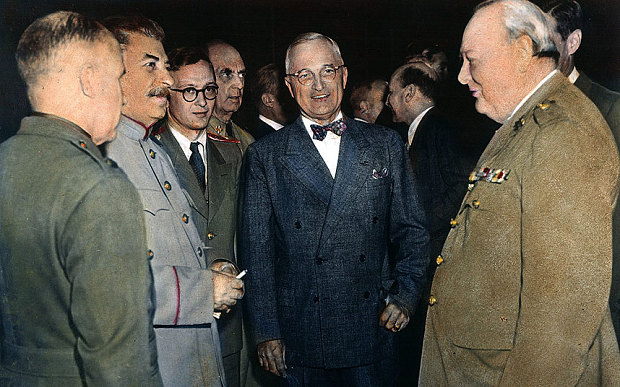“Chunks of Hitler’s desk that we found in the Chancellery. Everything was in ruins. I’m not sure whether we should have taken souvenirs, but we all had a piece,” said Joy Hunter. . .
Part of Churchill’s entourage that traveled to Berlin to participate in the Potsdam conference after the close of the war in Europe, she and others found medals of the Wehrmacht lying on the floor. The degree of destruction in Berlin was overwhelming, with the smell of death and people wandering in the streets and hoping to trade anything for cigarettes or a bar of chocolate.
She didn’t dwell upon her role at the time, involved in secret work as a secretary in the Cabinet War Office. Now she bears witness as few other participants remain. “It’s much more fun looking back than it was at the time,” she says now at the age of 84. “Everyone’s so interested and questions bring up things long buried, long forgotten.
“The Potsdam conference was the absolute cream and very thrilling, You had a great sense of history,” said Mrs. Hunter. “I shook hands with Stalin and Truman. Stalin was exactly as I expected him to look: in uniform with that great moustache.”
The British delegation stayed in a grand house that was hurriedly evacuated by its previous occupants and books, papers and toys were laying about. She found a gold stamped photo album in which she proceeded to record her impressions of those weeks, now a valuable reminder of the historic events that included a post-war social scene, taking place in the midst of conference duties. There are French menus, official passes and dance invitations included in the album, a copy of which can be found on display at the Imperial War Museum, The Telegraph reports.
Joy’s parents sent her to secretarial college in Lincolnshire where she excelled in stenography as well as typing and other skills. She was initially part of more than 60 girls in a typing pool after joining the War Cabinet office in January of 1944 at the age of 18. Due to her qualifications however, she was soon required elsewhere in other departments for various duties, and was then posted in underground offices of the War Cabinet where marines stood guard. The heavy scent of cigarettes and cigar smoke permeated the facility, with the smell of bodies as deodorant wasn’t commonly used then. Too many people made for a sense of claustrophobia that was at times intense. Sometimes work didn’t finish, and they slept there on wooden bunks with rough sheets.
Most often, she returned to an old Church Army hostel where she reports that incendiary bombs were found on the rooftop frequently and she would have to kick them off, commenting now, “People ask me if I was frightened. I find that a strange question. There was no time to be frightened.” She had never shared her experiences with members of her family. Now, bringing up those memories again has been therapeutic for her. “I don’t believe we should live in the past, but we shouldn’t forget it either. We should learn from it. But we don’t seem to have done and maybe we never will.”
